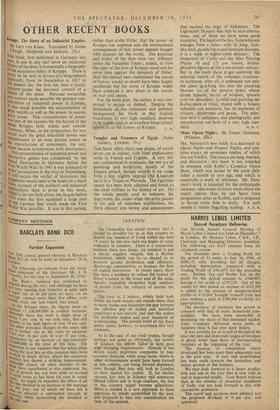OTHER RECENT BOOKS
. PPs: The Story of an Industrial Empire. BY Gert von Klass. Translated by James (lough. (Sidgwick and Jackson. 25s.) HIS book, first published in Germany last r, is not in any real sense an industrial istory of the firm; it is.essentially a biography I the successive rulers of Krupps. There is och to be said in favour of a biographical Pproach; from its foundation in 1812 to C present day the firm has been a family °kern under the personal control of a rer of the name. Personal ownership "(1 control made possible the greatest con- ration of industrial power in Europe; 11 also made possible the accumulation of IlrcW wealth as well as the power to sustain great losses. This concentration of power vias onc of the reasons for the hatred of the 11,arno Krupps both within and outside ‘Iertnany. When, in the preparation for two acKI wars the great industrial power was concentrated to an even greater extent in the manufacture of armaments, the very name became synonymous with destruction. Th▪ is concentration of industrial power and • tructive genius was condemned by the Pcial Democrats in Germany before the fast World War; in 1947 it was subjected to livider accusations in the trial at Nuremberg. .t still awaits the verdict of historians; but 1futigement would need tc; be based on a much .oller account of the political and industrial 14Plications than is given in this book. 'ere is far too little about the decade before 914 when the firm equipped a large part (• %),‘,E; the German fleet which made the First orld War possible. It was in that period,
rather than under Hitler, that the power of Krupps was supreme and the international consequences of that power seemed fraught with disaster for the world. The position and policy of the firm were very different under the Versailles Treaty; indeed, in 1934 the ruler of the, firm of Krupps stood out for some time against the demands of Hitler. Had this refusal been maintained the course of history wOuld no doubt have been largely unaffected but the name of Krupps might have achieved a new place in the annals of war and peace.
For the most part, the author is not con- cerned to excuse or defend. Despite the limitations of .the industrial and political background, his book, in this English translation of very high standard, deserves to be vddely read as an excellent biographical aii*.ch to the history of Krupps. H.








































 Previous page
Previous page